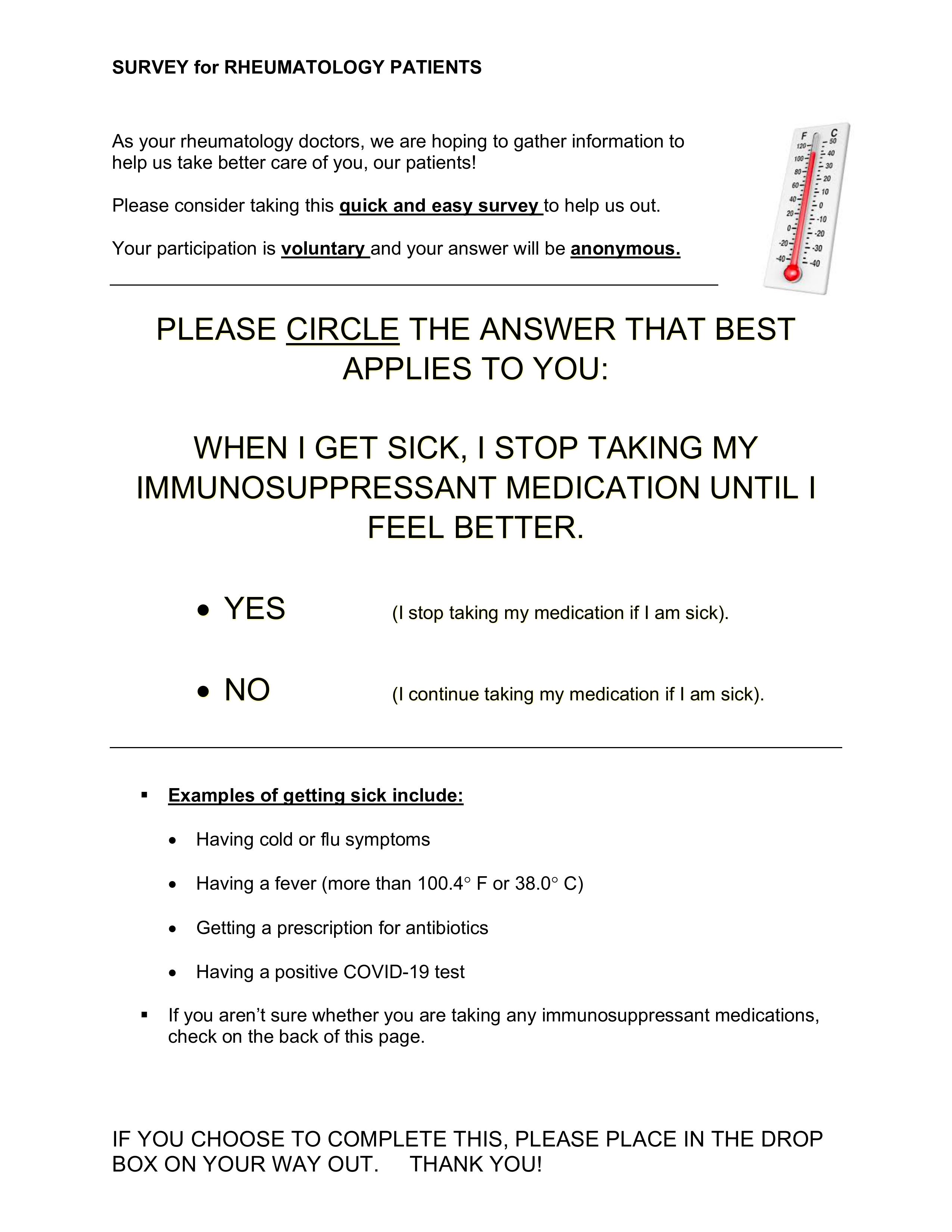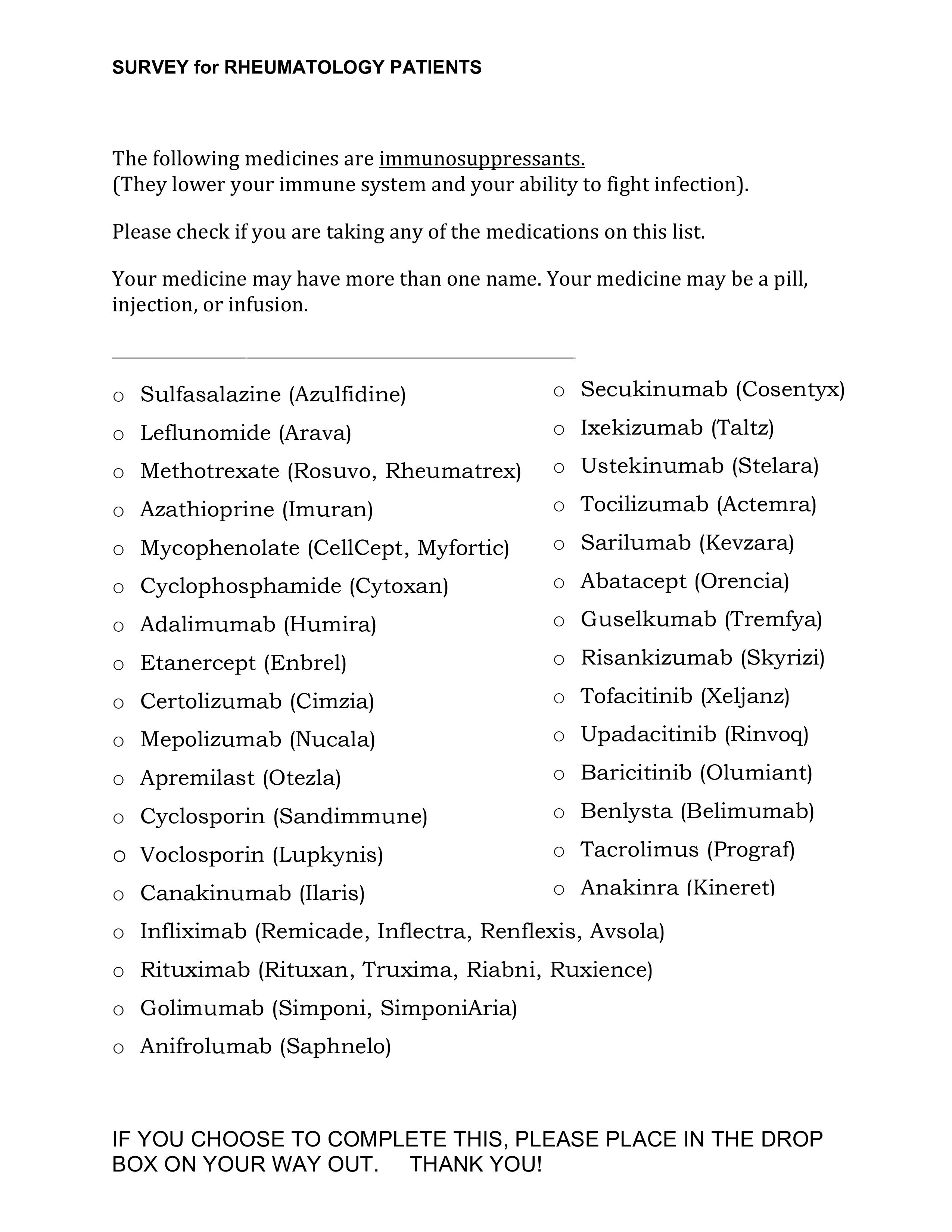Session Information
Session Type: Poster Session C
Session Time: 10:30AM-12:30PM
Background/Purpose: Acute infections are common among rheumatology outpatients receiving immunosuppressive medications (IS). Expert guidance advises pausing IS during acute infection, resuming only when clinically improved, known as “sick day rules.”1 Prior studies in non-rheumatologic illnesses such as adrenal insufficiency, where medication doses must be adjusted during acute illness, have suggested poor patient understanding of similar rules.2 However, neither this problem nor its solution is very well documented among rheumatology outpatients receiving IS. A recent cross-sectional study3 in our rheumatology clinic reported concerning noncompliance rates. In this phase 2 study, we aim to improve the rate of proper adherence to “sick day rules” in a general rheumatology clinic, hypothesizing that adherence rates would improve significantly after we implemented clinic-wide counseling.
Methods: This study compares cross-sectional data from general rheumatology outpatients in spring 2023 (pre-intervention) and 2024 (post-intervention). Participants completed the same one-page, de-identified survey both pre- and post-intervention [Figure 1; available in both English and Spanish], responding ‘yes’/’no’ to the statement: “When I get sick, I stop taking my IS until I feel better.” Patients on any current DMARD therapy were eligible, excluding those only taking hydroxychloroquine and/or colchicine, and were asked to indicate their current medications. Patients without an active DMARD prescription, and those unable to read English or Spanish, were ineligible. The 3-month intervention period consisted of brief, dedicated “sick day rules” counseling at each clinic visit, as well as signage posted throughout the clinic.
Results: Pre-intervention data from 73 patients showed 41% noncompliance, with 30 patients indicating they did not interrupt IS during illness. 9 of 37 (24%) of biologic DMARD (bDMARD) users and 21 of 36 (58%) conventional synthetic DMARDs (csDMARD) users responded “no.” Post-intervention data from 21 patients showed a decrease in noncompliance to 20%. Noncompliance among csDMARD patients decreased to 37% (3 patients), while bDMARD noncompliance fell to 8% (1 patient).
Conclusion: In phase 1, about 40% of patients on IS did not properly follow “sick day rules.” After an intervention of in-person counseling and instructional signage, noncompliance was halved, particularly among bDMARD patients. However, csDMARD users showed higher noncompliance, indicating an ongoing need to reinforce “sick day rules.” Our relatively simple intervention improved adherence to recommendations, highlighting a crucial area for quality improvement and harm reduction. Limitations include small post-intervention sample size, as well as risk of completion bias, potentially lowering the response rate in patients with poorer health literacy and worse disease control. Next steps will include extending phase 2 data collection and continuing to implement counseling or the foreseeable future.
To cite this abstract in AMA style:
Aksoy* M, Gonzalez Manrique P, Greenblatt H, Gilek-Seibert K. Boosting Adherence to “Sick Day Rules”: A Quality Improvement Study in Rheumatology Outpatients on Immunosuppressive Medications, Results of Post-intervention Phase [abstract]. Arthritis Rheumatol. 2024; 76 (suppl 9). https://acrabstracts.org/abstract/boosting-adherence-to-sick-day-rules-a-quality-improvement-study-in-rheumatology-outpatients-on-immunosuppressive-medications-results-of-post-intervention-phase/. Accessed .« Back to ACR Convergence 2024
ACR Meeting Abstracts - https://acrabstracts.org/abstract/boosting-adherence-to-sick-day-rules-a-quality-improvement-study-in-rheumatology-outpatients-on-immunosuppressive-medications-results-of-post-intervention-phase/


